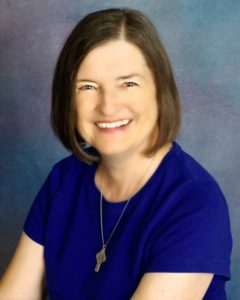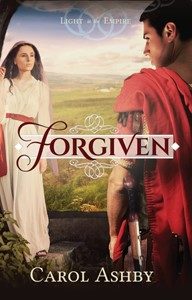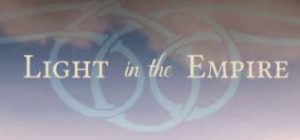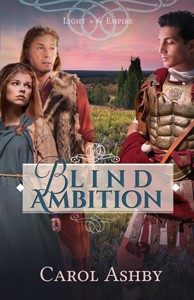
You meet people over the Internet in many different places. Sometimes you meet them in real life; sometimes you don’t. I’ve never met Carol Ashby. We know each other a little from following the other’s comments at the “Between The Lines” blog of the Books & Such Literary Agency. I saw Carol post a comment about writing Roman Empire era books. I’m not writing about the empire, but my church history novels are set in the Roman Empire. So, I thought I’d like my readers know about Carol and her books. Hence, this interview.
DT: You say you’ve written professionally all your life, in things such as lasers and semiconductors. Now you’re also writing creatively. Tell me about what brought that on.
CA: Writing creatively; that’s a good distinction, Dave. While research is creative work because you’re pushing the frontier of what’s known, you don’t write it up “creatively.” When I was publishing in sci-tech, I was always careful to make sure it read as good science, not science fiction.
So why the switch? For several years, I’ve been watching the persecution so many Christians face in too many parts of the world, but especially now with ISIS. I was thinking about the parallels to the situation when Imperial Rome tried to destroy the followers of Jesus. Then the story that will be the second novel in the Light in the Empire series, Blind Ambition, came to me the last Friday in September in 2013. I started writing the first high-tension scene of the novel that night.
DT: Looking at your Amazon page, I see your published novel, Forgiven. The cover suggests ancient Rome. Tell us about your novel.

Forgiven is actually the fourth novel I wrote, but I decided to bring it to market first. It’s set in Roman Judea, and I had hoped to ride the wave of a blockbuster movie. Ben Hur didn’t do well in American theaters, although it did much better overseas. The wave here was more like the waves on a lake than something a surfer could ride.
Forgiven is a much better choice for my first published novel since it deals with a problem we all suffer from: how can we forgive what seems unforgivable? How do we keep our anger over something that can never be changed from poisoning the way we treat similar people who may have had nothing to do with what happened? How can we forgive them if it turns out they were responsible but didn’t mean to do it?
Forgiven takes place in Galilee only 10 years before the Bar Kochba Revolt that finally ended the Jewish hope for freedom from their Roman overlord. In AD 122, Rome had already destroyed the Temple in Jerusalem, and only 5 years earlier it ruthlessly crushed the Kitos Rebellion. Jewish anger was simmering close to the surface, and the Roman troops charged with keeping the province peaceful never knew when violence would erupt.
In that caldron of unrest, a Messianic Jewish family is trying to live peacefully as they follow Jesus as their Messiah. Then the oldest son leaves to join the zealots in their guerilla attacks on the Romans. The second son goes to persuade his brother to come home, and a Roman officer kills him by mistake.
That accidental killing is the starting point of the story. Then the reader meets the brother of the Roman officer who killed the second son. He’s planning to kill his older brother for a larger inheritance and blame a zealot. His hired assassins bungle the job. When the dead son’s twin sister and younger brother are faced with the choice of rescuing the badly injured Roman or letting him die, they obey Jesus’s command to love their enemy and take him home. Rachel persuades her father to put his love for Jesus above his anger with Rome, pretend Lucius is Greek to protect him, and let him stay with them until he heals.
His brother wants him dead, her older brother wants to kill him if he’s Roman, and her father obeys Jesus’s command but struggles with having him around because he’s part of the group that killed his son. Forgiven is a story of love, hatred, friendship, and forgiveness. It portrays the emotional and spiritual struggles of more than one character leading to a deadly climax and, I hope, a satisfying conclusion.
DT: It’s part of a series titled “Light In The Empire”. What are your plans for this series?
 I’m planning six to eight novels in the series. Each focuses on a deep cultural conflict based on ethnicity or class, the power of Christian love to overcome those, and the transformation of people that can result in response to that love. Each picks up one or more characters from another novel in the series and places them in challenging circumstances where decisions about living their faith must be made.
I’m planning six to eight novels in the series. Each focuses on a deep cultural conflict based on ethnicity or class, the power of Christian love to overcome those, and the transformation of people that can result in response to that love. Each picks up one or more characters from another novel in the series and places them in challenging circumstances where decisions about living their faith must be made.
Each one is a story of hope about human love and spiritual transformation, a story about how our faithfulness can inspire another to open his or her heart to God. It’s interesting how the plot for the next novel that’s a new twist on the theme takes shape in my mind even before I finish the one I’m working on. As long as that keeps happening, I’ll know God wants me to keep writing the Roman series.
DT: You said the second novel in the series will be out by May. Tell us about that one.

Blind Ambition is actually the first novel I wrote. It’s set in AD 114 mostly in Germany near Mainz. The tagline describes it well: “Sometimes you have to almost die to discover how you want to live.”
The provincial governor has given the Christians in his province the option of sacrificing to Caesar or dying. His son, Decimus, is a tribune in the legion who’s headed for a stellar political career like his father. When he’s robbed, blinded, and left for dead, a young German woman who follows the Way finds him. Valeria knows it’s his duty to have her and her family killed, but she chooses to love her enemy and takes him home to care for him. Decimus has been raised to think of Christians as vermin to be exterminated for the good of Rome, so what’s he going to do when Valeria and her brother and sister love him like family while never hiding their love for Jesus from him?
DT: So, are you working on the next book in the series, and perhaps the next after that?
CA: I have two more novels that are finished and ready for the final editing. They should be out within the next year or so. I have another two that are fully plotted and about half written. There’s a fifth that I’ve partly written that will probably end up novella length. Plus I have some rough plans for two more. They all follow the series theme of difficult friendships growing into love coupled with the spiritual transformation of characters whose journey to faith is inspired by the faith of those who love them.
DT: Do you see yourself branching out from ancient Rome as the underlying period for your work in the future?
CA: I’m compulsive about getting the history right. I’ve got so much invested in both time and academic books (more than 60 at the moment) about the Roman period that I decided to create a Roman history site at carolashby.com with what I’ve learned. I write articles on different topics (taxation and medicine are next), review Roman-era books, make Latin wordsearch and crosswords, and post real Roman recipes with fun facts about ancient culinary practices. Each morning, I look to see where the site visitors came from during the night, and so far, they’re from 39 different countries, counting the US.
That was my first “author” website. It’s lots of fun for me, but not very personal and not a springboard to different settings. Most of my international visitors probably aren’t interested in Christian historical fiction, either.
I’ll be publishing Roman for a while, but I’ve already branched out a bit. The second novel I started writing was actually a romantic thriller set in Colorado in 1925. It’s another story about the power of Christian love to overcome differences in class, ethnicity, and the expectations of family and society, but I don’t have plans to bring it to market for a while. I set it aside while I wrote 3 more Roman novels. I went back to it and “finished” it over a year ago to enter a contest, but working on the Roman novels keeps me pretty busy.
DT: You said you are self-publishing the series What led to that decision?
CA: My husband and I decided from the beginning that we would donate the profits and offer the novels for more creative ways to support missions in Africa and the Middle East. When I learned that I would be selling all my rights to the books and not be able to use them like we wanted if I went the traditional publishing route, I took several deep breaths and made the leap into independent publishing. There’s a lot involved in doing that successfully, but if that’s what it takes to keep the flexibility that comes from owning the rights myself, then I’m willing to do it.